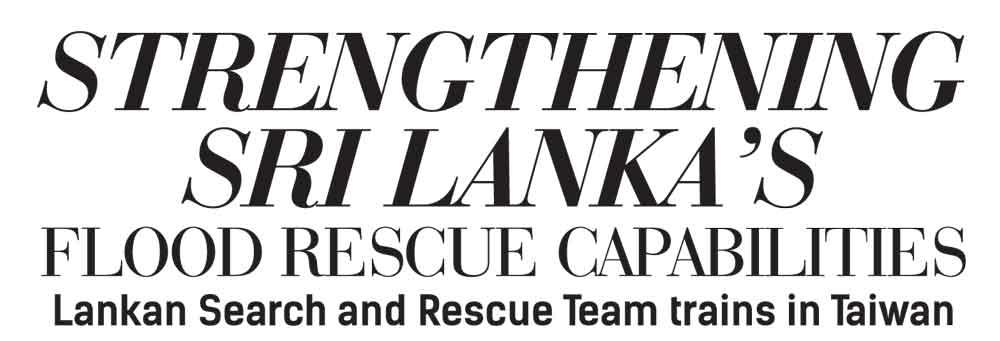Reply To:
Name - Reply Comment

|
Flood rescue training
|
Sri Lanka’s extensive river network makes it highly vulnerable to flooding, worsened by rising rainfall intensity. Strengthening water rescue training and resources is crucial for safeguarding lives and mitigating disaster impacts. As flooding events become more complex, continuous adaptation and expansion of rescue capabilities are essential to address these challenges.
2024 Joint Indo-Pacific Region Swift Water and Rope Rescue Training Programme
In its continued efforts to enhance disaster preparedness in Sri Lanka, the Asia Pacific Alliance for Disaster Management Sri Lanka (A-PAD SL) recently sent its team of Search and Rescue (SAR) personnel to Taiwan for advanced swift water rescue training.
The “2024 Joint Indo-Pacific Region Swift Water and Rope Rescue Training Programme,” held from October 27th to November 8th, was co-hosted by the National Fire Agency (NFA) of Taiwan’s Ministry of the Interior and A-PAD International, and supported by the Connecting Business Initiative (CBI). The programme aimed to improve participants’ skills in swift water and rope rescue techniques, facilitate knowledge exchange with international counterparts, and foster regional cooperation in disaster response.
A total of 14 participants from Sri Lanka joined representatives from Japan, the Philippines, Thailand, and Taiwan for the training. The Sri Lankan group included members from the Navy, Public sector, Private sector, and A-PAD SL. Led by certified international trainers, the two-week intensive training programme covered top-tier techniques designed at par with the international swift water rescue standards.
Swift Water Search and Rescue Training
The swift water training began on Taiwan’s Xiuguluan River. Known for its challenging rapids, it provided an ideal setting to practice essential rescue skills such as identifying currents, drifting, rafting, boat capsizing, and river crossings, both individually and in groups. The training then progressed to whirlpool rescue operations in a specialized simulation facility, where participants honed survival skills and coordinated rescue scenarios. Building on these techniques, they mastered aggressive swimming, secure swimming, and two-man rescues.
In-depth training also covered team rescue strategies and night survival tactics, with a focus on maintaining strong communication and coordination under pressure. Advanced exercises like rappelling into water, obstacle navigation, and fixed-point setup tested participants’ endurance, teamwork, and ability to perform under stress.
Though demanding, these rigorous sessions significantly enhanced participants’ skills and preparedness for real-world swift water rescue scenarios. The lead trainers of the programme were Mr. Huang Chun-Yuan and Mr. Lu Ruei-Hsi.
Rope Rescue Training
The 2024 Joint Indo-Pacific Region Swift Water and Rope Rescue Training Programme taught participants advanced rescue techniques, including high-angle rescues, stretcher evacuations, and safety protocols, ensuring effective and safe response in challenging rescue situations.
It included a critical High Angle Stretcher Operation, simulating the rescue of a victim from an elevated position and transporting them safely to a secure location. Participants demonstrated advanced rope techniques, strategic coordination, and adaptability under challenging conditions. This final exercise reinforced the critical importance of precision, teamwork, and technical expertise in executing high-stakes rescue operations.
Public-Private Partnership in SAR
The closing ceremony, marking the culmination of the programme, featured the presentation of internationally recognized certificates to all participants in recognition of their hard work and achievements. The event was attended by prominent officials, including Firzan Hashim, Country Director of A-PAD SL, Jien Wan Yiao, Deputy Director of NFA of Taiwan; and Shie Xhu Zhang, Director of the NFA Training Facility. Special tokens of appreciation were also given to trainers and dignitaries in recognition of their support.
Since 2017, A-PAD SL has promoted civil-military coordination (CIMIC) through SAR training, recognizing the value of public-private partnerships in disaster response. This regional session advances CIMIC and provides first responders with crucial skills to enhance Sri Lanka’s flood response capabilities. The program strengthens national resilience, aligns with global best practices, and aims to reduce the impact of natural disasters.